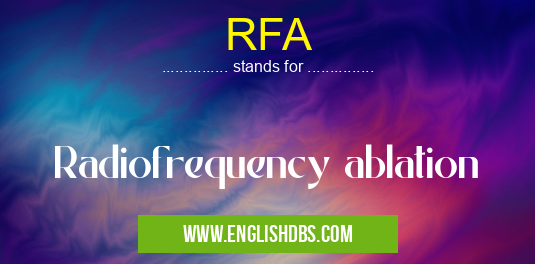What does RFA mean in REHABILITATION
Radiofrequency ablation (RFA) is a medical procedure sometimes used to relieve pain. It is usually performed on people who suffer from chronic pain, such as those with cancer, rheumatoid arthritis, or other conditions that cause chronic pain. RFA uses targeted energy to destroy the nerve endings causing the pain so that the patient can experience relief from their symptoms. In this article, we will discuss what RFA means and how it works

RFA meaning in Rehabilitation in Medical
RFA mostly used in an acronym Rehabilitation in Category Medical that means Radiofrequency ablation
Shorthand: RFA,
Full Form: Radiofrequency ablation
For more information of "Radiofrequency ablation", see the section below.
Essential Questions and Answers on Radiofrequency ablation in "MEDICAL»REHABILITATION"
What is Radiofrequency ablation?
Radiofrequency ablation (RFA) is a procedure that uses electrical energy delivered through a small electrode to heat and destroy abnormal cells or tissue. It is often used to treat several conditions, including cancer, atrial fibrillation, and pain.
How is the RFA Procedure Performed?
During an RFA procedure, your doctor will insert a thin needle with an electrode attached into the area of your body where they want to perform the ablation. The device delivers high-frequency electrical current to the area, heating it up enough to destroy any abnormal cells or tissue in the area. This helps reduce symptoms of various conditions.
What Types of Conditions Can RFA Treat?
RFA can be used to treat different types of cancers, such as liver cancer, kidney cancer and prostate cancer. It can also be used to treat arrhythmia known as atrial fibrillation or chronic pain caused by nerve damage. Your doctor may recommend RFA for other conditions as well.
Is RFA Safe?
Yes, when performed correctly by an experienced healthcare professional, radiofrequency ablation is a very safe and effective treatment option for various conditions, including cancer and pain reduction due to nerve damage.
Are there Side Effects from Getting Radiofrequency Ablation Treatment?
Common side effects from getting RFA include swelling at the site of insertion of the needle or electrode during treatment, bleeding at the site of insertion and discomfort in the area afterwards. Serious side effects are rare but can include infection or damage to nearby blood vessels which can lead to further complications.
How Long Does it Take To Recover From Having an RFA?
The recovery time after an RFA depends on your particular condition and how much tissue was treated during the procedure. Generally speaking you should expect anywhere between 1-3 days for mild discomfort following treatment and up 4 weeks for more serious conditions being treated with radiofrequency ablation.
Is There Any Preparation Needed Before Undergoing Radiofrequency Ablation Treatment?
You may be asked to fast before undergoing RFA treatment since general anesthesia will be administered during this process. Your doctor may ask you about any medical history that you have prior to beginning this treatment as well so make sure you provide them with full disclosure on any medications you are taking or any pre-existing conditions that you have.
RFA also stands for: |
|
| All stands for RFA |
